词类 句子成分
词、词组、句子成分

(18)说起来可笑,小时候有一回上树掐海 棠花,不想叫蜜蜂螫了一下,痛得我差点儿跌 下来。( 《荔枝蜜》)
(19)我独自一人游荡在田野里 。(《挖荠 菜》)
(20)从化的荔枝树多得 像一片碧绿的大海 , 开花时节,那蜜蜂满野嘤嘤嗡嗡,忙得忘记早 晚 ,有时还趁着月色采花酿蜜。( 《荔枝 蜜》)
◆助词:附加在词、短语、句子上起辅助作用的词。
助词可以分为三类。一类是结构助词,它们是“的、 地、得、所、似的”;一类是动态助词,它们是“着、 了、过”;一类是语气助词,如“啊、吗、呢、吧、 呐、呀、了、么、哇”。
◆叹词:表示感叹、呼唤、应答的词叫做叹词。“喂、
哟、嗨、哼、哦、哎呀"。叹词总是独立成句。
◆介词:介词总是同其他的词组合在一起,构成介 词短语,做定语、状语和补语。如"把、从、向、朝、 为、为了、往、于、比、被、在、对、以、通过、 随着、作为"。
◆连词:连词可以连接词、短语、句子乃至段落。
如"和、及、或者、或、又、既"。关联词语可以看成 是连词,如"因为……所以、不但……而且、虽 然……但是"。
句子成分
什么是句子???? 有什么构成?有没有语调?句子 有什么作用?
句子: (1)由词和短语构成 (2)带有一定语调 (3)表示相对完整的意思。
你知道句子有哪些构成成分?
主、谓、宾、定、状、补
主谓宾定状补,一般成分弄清楚。 基本成分主谓宾,附加成分定状补。 主语讲谁或什么,陈述主语是谓语。 动词涉及人或物,涉及成分叫宾语。 修饰限制算定状,补充说明就是补。 定语用在主宾前,谓前为状谓后补。 还有标志的地得,帮助分清定状补。 注意位置和关系,认真分析莫疏忽。
◆拟声词:这是模拟声音的词。如"呜、汪汪、轰隆、
词类与句子成分

词类与句子成分一、什么是词?词,是语言里最小的、可以自由运用的单位。
例如:山、水、走、兴奋、玻璃、坦克、中国、人民、奥林匹克、中华人民共和国…… 二、词的分类1、名词:表示人或事物名称。
2、动词:表示动作、行为、心理活动或存在、变化、消失、判断等。
3、注意:名词、动词、形容词的语法性质有明显的不同,应注意辨别。
(1) 绝大部分的名词前面可用数量词来修饰。
(2) 绝大部分的动词前面可用否定副词“不”或“没(没有)”来修饰。
(3) 绝大部分的形容词前面可用程度副词“很” 来修饰。
4、 5、 6、 7、副词经常用在动词、形容词前面,表示程度、范围、时间、否定、语气、频率等。
时间方位处所人和事物的名称鲁迅老师桌子操场书本思想情绪昨天下午暑假苏州南京前、后东边判断可能意愿使令心理活动存在变化动作行为走观察学习增加消失想念厌恶请命令能够愿意是形容词长、短、粗、高大……高尚、乐观、懦弱……迅速、朦胧、遥远……(表示形状)(表示性质)(表示状态)数词表示确数:三分之二、七百……表示概数:成千上万、若干……表示序数:初一、第八……量词物量词(数词+物量词+名词)一把铅笔动量词(动词+数词+动量词)讲了三小时代词我、你、自己……谁、什么、哪、怎样……这、那、每、各……(人称代词)(疑问代词)(指示代词)起替代作用处处、到处、四处表处所连续、又、再、也、还表重复很、更、最、过于、稍微表程度亲自、忽然、悄悄、单独情态、方式没有、不、必、也许表肯定、否定幸亏、居然、只好、难道表语气都、总、统统、仅仅、只表范围已经、曾经、将要、渐渐、往往、一直、一再时间、频率8、介词经常用在名词、代词或名词短语前面,组成介宾短语,起修饰和补充说明的作用。
9、10、连词起连接作用,常用来连接词、短语和句子。
例如:和、同、或、以及、并、不但、而且、虽然、但是、既然、尽管、于是、况且、因为、所以11、拟声词:指模拟人或事物声音的词。
例如:沙沙、哗哗、乒乒乓乓、哇哇…… 12、叹词:表示某种情感或呼唤应答的声音。
词性句子成分
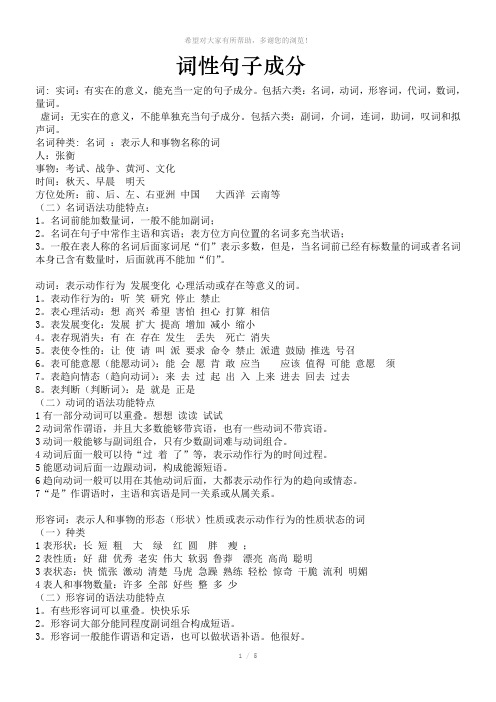
词性句子成分词: 实词:有实在的意义,能充当一定的句子成分。
包括六类:名词,动词,形容词,代词,数词,量词。
虚词:无实在的意义,不能单独充当句子成分。
包括六类:副词,介词,连词,助词,叹词和拟声词。
名词种类: 名词:表示人和事物名称的词人:张衡事物:考试、战争、黄河、文化时间:秋天、早晨明天方位处所:前、后、左、右亚洲中国大西洋云南等(二)名词语法功能特点:1。
名词前能加数量词,一般不能加副词;2。
名词在句子中常作主语和宾语;表方位方向位置的名词多充当状语;3。
一般在表人称的名词后面家词尾“们”表示多数,但是,当名词前已经有标数量的词或者名词本身已含有数量时,后面就再不能加“们”。
动词:表示动作行为发展变化心理活动或存在等意义的词。
1。
表动作行为的:听笑研究停止禁止2。
表心理活动:想高兴希望害怕担心打算相信3。
表发展变化:发展扩大提高增加减小缩小4。
表存现消失:有在存在发生丢失死亡消失5。
表使令性的:让使请叫派要求命令禁止派遣鼓励推选号召6。
表可能意愿(能愿动词):能会愿肯敢应当应该值得可能意愿须7。
表趋向情态(趋向动词):来去过起出入上来进去回去过去8。
表判断(判断词):是就是正是(二)动词的语法功能特点1有一部分动词可以重叠。
想想读读试试2动词常作谓语,并且大多数能够带宾语,也有一些动词不带宾语。
3动词一般能够与副词组合,只有少数副词难与动词组合。
4动词后面一般可以待“过着了”等,表示动作行为的时间过程。
5能愿动词后面一边跟动词,构成能源短语。
6趋向动词一般可以用在其他动词后面,大都表示动作行为的趋向或情态。
7“是”作谓语时,主语和宾语是同一关系或从属关系。
形容词:表示人和事物的形态(形状)性质或表示动作行为的性质状态的词(一)种类1表形状:长短粗大绿红圆胖瘦;2表性质:好甜优秀老实伟大软弱鲁莽漂亮高尚聪明3表状态:快慌张激动清楚马虎急躁熟练轻松惊奇干脆流利明媚4表人和事物数量:许多全部好些整多少(二)形容词的语法功能特点1。
词类,句子成分构词法
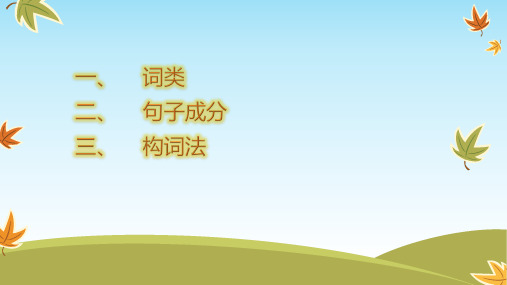
转化
示
例
名词 fish 鱼/ 钓鱼 hand手/递 watch手表/观看 water 水/浇
动词 名词
light
光线 轻的
right
右边 对的
wrong
坏事 错误的
quiet
安静 安静的
final
决赛 最后的
形容词
动词 形容词
clean 打干扫净的
close
关上 近的
free
使自由dry 自由的
-ty forty, fifty
dis-(否定) disable, disappear, disagree, dislike, disbelieve不相信
前
im-/in-(不) impossible, important, impolite, imperfect有缺
点的
incorrect, 不确的
• 二、 派生法
• -er driver, leader, worker, owner, reader, speaker,traveler,hunter猎人 -or visitor, actor, inventor, director 导演, sailor水手,operator操作员
名 -ese Chinese, Japanese, Cantoness广东人 词 -ian Australian, Canadian, Indian, Austrian奥地利人 后缀 -ist artist, pianist, scientist, violinist, typist打字员,
. 宾语补足语:用来说明宾语怎么样或干什么,通常由形容词或动词充当。如:
They usually keep their classroom clean. He often helps me do my lessons. • ☆同位语通常紧跟在名词、代词后面,进一步说明它的情况。如:Where is your
词类,句子成分,构词法,5种基本句型(学生版)

教师姓名学科英语课题名称词类,句子成分,构词法,5种简单句基本句型学生姓名年级九上课时间教学目标在学好英语单词的基础上,理解英语中最基本的语法概念。
教学重难点句子成分,构词法,5种简单句基本句型专题知识梳理Step 1 词类,句子成分,构词法1、词类英语词类分十种:名词、形容词、代词、数词、冠词、动词、副词、介词、连词、感叹词。
(1)名词(n.):表示人、事物、地点或抽象概念的名称。
如:boy,morning,bag,ball,class,(2)代词(pron.):主要用来代替名词。
如:who,she,you,it .(3)形容词(adj.):表示人或事物的性质或特征。
如:good,right,white,orange .(4)数词(num.):表示数目或事物的顺序。
如:one,two,three,first,second,third,fourth.(5)动词(v.):表示动作或状态。
如:am,is,are,have,see .(6)副词(adv.):修饰动词、形容词或其他副词,说明时间、地点、程度等。
如:now,very,here,often(7)冠词(art.):用在名词前,帮助说明名词。
如:a,an,the.(8)介词(prep.):表示它后面的名词或代词与其他句子成分的关系。
如in,on,from,above,. (9)连词(conj.):用来连接词、短语或句子。
如and,but,before .(10)感叹词(interj.):表示喜、怒、哀、乐等感情。
如:oh,well,hi,hello.2、句子成分英语句子成分分为七种:主语、谓语、宾语、定语、状语、表语、宾语补足语。
(1)主语是句子所要说的人或事物,回答是“谁”或者“什么”。
通常用名词或代词担任。
如:I’m Miss Green.(2)谓语动词说明主语的动作或状态,回答“做(什么)”。
主要由动词担任。
如:Jack cleans the room.(3)表语在系动词之后,说明主语的身份或特征,回答是“什么”或者“怎么样”。
词类和句子成分

词类和句子成分Company Document number:WUUT-WUUY-WBBGB-BWYTT-1982GT词类和句子成分一、词类的定义:根据词的形式、意义及其在句子中的功能将词分为若干类。
备注:1、多个形容词修饰名词的顺序:限定词(冠词、物主代词、指示代词)+ 数词(three)+ 描绘词(beautiful)+ 大小、长短、高低等形体性形容词(large,long,high)+新旧(old)+ 颜色(red)+ 国籍(Chinese)+ 材料(wooden)+用途(writing)+被修饰名词(desk)口诀:限定描述大长高,形状年龄与新老;颜色国籍出材料,用途类别往后靠。
特殊形容词:距离 farther farthestfar程度 further furthest不规则的形容词:good better best bad/ill worse worst many/much more most few/little fewer/less fewest/least2、多个副词的排列顺序:时间、地点副词:小单位在前,大单位在后eg: The children played games quietly in their room yesterday.3、及物动词vt.:后面要跟宾语,意义才完整。
实义动词(有完全的词义,并能独立做谓语)不及物动词vi.:本身意义完整,后面不需要跟宾语。
动词的分类系动词:做谓语时,后接表语 eg: get, be, become, look情态动词:表示能力、义务、必要、猜测等说话的语气和情感 eg: can, could, must, may, might助动词:常和主要动词一起构成各种时态、语气、语态等动词形式,以及用于否定、疑问等结构中,有shall, will, have, be, should, would, do状态系动词:用来表示主语状态,只有be系动词感官系动词:有feel,smell,look,sound,taste持续系动词:用来表示主语继续/保持一种状态/态度。
词类,句子成分,句子种类

英语基础知识
六、状语 状语用于修饰动词、形容词、副词或整个句子。可以用作状 语的有:副词、名词、数词、形容词、不定式、分词、介词 短语、独立主格和从句等。 (2013· 高考浙江卷· 书 面表达 )Amazed at how skillful they were, I was determined to be just as good. 吃惊于他们熟练的技巧,我决心与他们一样好。(形容词作 状语) I opened the window to let some fresh air in. 我打开窗户让新鲜空气进来。(不定式作状语) (2012· 高考山东卷· 写 作 )By talking with them , my oral English improved a lot. 通过跟他们交谈,我的口语提高了很多。(介词短语作状语)
英语基础知识
代词
概念:
代词是代替名词的词, 按其意义、特征及 其在句中的作用分为:人称代词、物主代词、 指示代词、反身代词、相互代词、疑问代词、 不定代词和关系代词等。
英语基础知识
1.人称代词
英语基础知识
2. 物主代词 表示所有关系的代词叫物主代词。物主代词分形容词 性物主代词和名词性物主代词。
Love English
英语基础知识
英语基础知识
第一讲
词类
英语基础知识
英语中的单词可以分为十大词类:
① 名词 n.
② ③ ④ ⑤ ⑥ ⑦ ⑧ ⑨ ⑩
teacher, book等。 代词 pron. we ,me, he 等。 数词 num. two, fifth 等。 动词 v. work, study, live 等。 形容词 adj. good, big, beautiful 等。 副词 adv . fast, quickly等。 冠词 art. a, an, the等。 介词 prep. in, on, by, with等。 连词 conj. and, but等。 感叹词 interj. Oh, ah等。
语文语法基础知识-词类和句子成分.
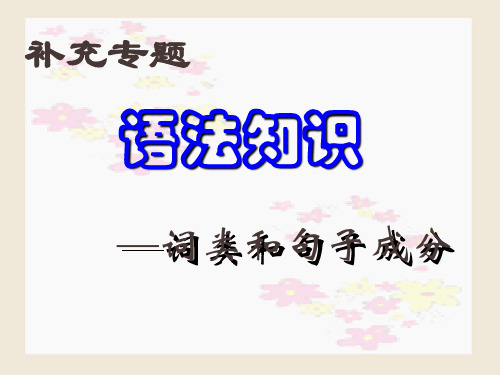
2、谓语 是对主语加以陈述的,说明主语怎么样或是什 么。一般由动词和形容词充当。 (1)满天乌云顿时消散了。 ------- (2)树叶黄了。 ------- (3)鲁迅是中国现代文学的奠基人。 ------------------------------------------ 主谓短语也可以做谓语,例如: 同学们‖心潮如海。 明媚如画的江南水乡,‖歌声阵阵。
啊、哎呀
拟声词
模拟声音的 丁当、扑通、 喵喵 词
把下面一段话分解成词,并指出词性。
我提着这灵巧的小桔灯,慢慢地在黑暗潮 湿的山路上走着。这朦胧的桔红的光,实在 照不了多远;但这小姑娘的镇定、勇敢、乐 观的精神鼓舞了我,我似乎觉得眼前有无限 光明!
练习答案
我 提 着 这 灵巧 的 小 桔灯,慢慢 地 在 黑暗 潮湿 的 山路 上 走 着。这 朦胧 代动助代 形 助 形 名 形 助介 形 形 助 名 名动助 代 形 的 桔红 的 光,实在 照 不 了 多远;但 这 小 姑娘 的 镇定、勇敢、乐观 的 精神 助 名 助名 副 动副助 形 连 代形 名 助 形 形 形 助 名 鼓舞 了 我,我 似乎 觉得 眼前 有 无限 光明! 动 助 代 代 副 动 名 动 形 名
例:文科班的班长向老师说清楚班里发生的事情。
划分句子成分
1、日光的照射特别强烈。 2、总理那高大的形象总是浮现在我的眼前。 3、船长已经不耐烦我父亲的那番话。
4、经过多少世纪的风雨,她仍然立在死海附近的
山坡上。 5、一杯 冒着 热气的茶放在我左手的桌角上了 。 6、这小姑娘的镇定、勇敢、乐观的精神 鼓舞了 我。 7、闰土的心里有无穷无尽的希奇的事。
(1)广大人民干得热火朝天。 〈 〉 (2)他写的字比原来不是好一点,而是好得多。 〈 〉 〈 〉 (3) 颜色是那么浓,浓得好像要流下来似的。 〈 〉
高三语文语文语法基础知识(词类和句子成分)

(二)介词
表方向:自、从、朝、往、向、顺等。 表方式状态:按照、依照、以等。 表目的:为了、为着等。 表对象或范围:把、对于、给、关于
等。 表排除:除、除了等。 表被动:被、让给等。
(三)连词
并列连词: 和、跟、与、同、及等。 承接连词: 至于、说到、此外、如、比方等 转折连词: 却、只是、不料、岂知等。 因果连词: 因为、由于、因此、以致等。 选择连词: 或、抑、非…即、不是…就是等 假设连词: 如果、假如、假使、倘若、要是
语法知识
词类
实词(能充当主、谓、宾) 虚词(不充当主、谓、宾)
名词 动词 形容词 数词 量词 代词
实词
(一)名词
人物名词:运动员、火车等。 时地名词:北京、春天等。 方位名词:上、下、左、右等。
பைடு நூலகம்
(二)动词
使令动词:使、让、请、令等。 比拟动词:像、似、如、仿佛等。 判断动词:是 能愿动词:能、会、可能、要等。 心理动词:爱、恨等 行为动词:打、走、跑等。
或伴随情况、程度的词。如: 东湖的风景[十分]秀丽。
状语后置:状语有时候可以放在中心语后 边。如: 我们尊重您,[永远永远]!
(六)补语
动词性词语后边起补述作用的 成分。
常常与“得”连用。如: 洗得〈满头大汗〉。 干得〈漂亮〉。
句子是由词或短语构成的语言单位,能表达一个相对 完整的意思,能完成一次简单的交际任务,在语音上有一 定的语调,表示陈述、疑问、祈使、感叹的语气,在书面 上用句号、问号、感叹号表示出来。
正确区分“的”、“地”、“得”
的:用在定中短语中,放在名词前面 如
我的学生 蓝蓝的天 可爱的孩子 前进的步伐
地:用在状中短语中,放在动词前面 如
词性和句子成分

分类练习代词1. I have two children, and _____ of them are working in the west of China.A.all B. both C. neither D. either2. May I have a talk with you, sir? I've got important to tell you.A. nothingB. anythingC. somethingD. everything3. -- I'm hungry, is there any bread in the fridge?--______but we have cakes. Would you like to have one?A. SomeB. MuchC. NoneD. Nothing4. —How do you usually come to school, by bus or by bike?—_________. I walk.A. EitherB. NeitherC. BothD. Any5.—Which club would you like to join, artclub or basketball club?—_________ is OK. I’m good at them.A. NeitherB. EitherC. BothD. All6. —Who is the man over there?—He is an old friend of _________ .A.IB. myC. mineD. me.7. —Yesterday I lost my pencil sharpener. I couldn’t find_______.—Oh, it’s a pity. You’d better buy ________ this afternoon.A. it; itB. it; oneC. one; itD. one; one8. All of us find _ necessary to take exercise every day.A. thisB. thatC. themD. it9.—Can you speak English, Mr Wang?—Yes, but only___A. littleB. a littleC. a lotD. a few10. —Oh, the traffic is so heavy.—Let’s change _____ route to the airport.A. otherB. othersC. the otherD. another11. I don’t like ______ when shop assistants follow me around.A. itB. thatC. whichD. them12. ‘Before she came around,' she says, ‘I was _______ in this town, everyone respect me'.A. somebodyB. nobodyC. everyoneD. who13. Last evening I did ________but repair my farm tools.A. nothingB. somethingC. noD. none14. Harry Potte r is so interesting a book that lots of teenagers like to read_________.A. itB. thisC. thatD. one15. The weather in Hangzhou is hotter than _______in Beijing.A. thatB. itC. whatD.whi冠词1. We usually go to school on weekdays, and sometimes goto cinema at weekends.A. 不填; theB. the; theC. the; 不填D. 不填;不填2. Look! There is _____ cat in the tree.A. aB. anC. theD. /3. There’s _____ apple on the table. ______ apple is for my little brother.A. a; AnB. an; AnC. the ; AnD. an; The4. There is big supermarket in center of our city.A. a; theB. the; aC. the; the5. I like music, but I don’t like ______ music of this film.A. aB. anC. theD.不填6. — Who’s that lovely girl?— You mean ______ girl with long hair? That’s Kate.A. aB. anC. theD. 不填7. I really like ______ book you lent me yesterday.A. aB. anC. theD. /8. _______ man riding a motorbike is _______ university teacher.A. A; anB. The; aC. The; anD. A; the9. On April 12, 1961,_____27—year—old Yuri Gagarin(尤里.加加林)became the first human to go into_____ space.A. the;不填B. the; theC. a;不填D. a; the10.—Would you please join us? —________, I'm notA. good a quite playerB. quite a good playerC. a quite good playerD. quite gooda player11. He has tried four times, but his teacher wants him to try __fifth time.A. theB. aC. /介词1. I was so tired after the marathon,so I leaned ______the wall to have a rest.A. onB. inC. againstD. with2. Taiwan lies _____ the south of China and ___ the east of Fujian Province.A. in; toB. to; toC. in; onD. to; on3. Hangzhou is famous for the West Lake , compared _____paradise on the earth.A. withB. toC. asD. for短语动词1. Mike promised to ______his friend at the airport, but he hasn’t arrived yet.A. Pick upB. bring upC. put upD. grow up2. They are going to_______Hamlet.A. put awayB. put upC. put offD. put on3.—Do you have iphone5 mobiles?—Sorry, they have been ______.You may come next weekA. given outB. looked outC. sold outD. come out4. Luckily, everything has _______well according to the plan.A. come outB. worked outC. put outD. given out5. Don't __________ too late. or you will feel tired in class.A. wake upB. get upC. stay upD. stand up时态1. —When will he leave for Shanghai? —As soon as he _ his work.A. finishedB. will finishC. is finishingD. finishes2.—Lin Kai, hand in your homework, please.—Oh, sorry. I ______ it at home this morning.A. was leavingB. has leftC. will leaveD. left3.-I’ve got a ticket for the basketball game tonight.-Cool!How you it?A. had, gotB. did, getC. were, gettingD. has got4. :You ___________ your mind. I can’t stand you.A. are always changingB. always changesC. have always changedD. always changed5. —What’s that noise?—Oh, I forgot to tell you. The neighbors __ for a party.A. prepareB. are preparingC. will prepareD. have prepared6. I didn't hear you because I the news on the radio.A. listen toB. am listening toC. listened toD. was listening to7. I was very angry with John—he just_______ when I spoke to him.A. isn’t listeningB. hasn’t listenedC. didn’t listenD. wasn’t listening8. -Do you know our town at all?-No, this is the first time I ___ here.A. wasB. have beenC. cameD. am coming9. Echo _____ for half a month. She’ll come hack in two months.A. left B leave C. has left D. has been away10. Great changes _________ in Tongren in the past five years.A. have happenedB. have taken placeC. have been happenedD. have been taken place11. Have you ever been to Beijing.------Yes, I ________there last year.A. wentB. went toC. have beenD. have been to被动语态1. The young teacher has ____ competent.A. been proved to beB. proved to beC. been provedD. proved being2. As we approached the work site, the workers were seen ____the new house.A. buildingB. buildC. builtD. to build3.—Have you finished your fashion design?—Not yet. I’ll finish it if I ________ ten more minutes.A. am givenB. giveC. will giveD. will be given4. In many places in China, the old over 90 not only bytheir family but also by the government.A. is taking good careB. are taken good care ofC. is taking good care ofD. are taken good care5. The pen my good friends gave me as a birthday present ______well. I like it very much.A. writesB. wroteC. is writtenD. writing6. Han Han’s new book Youth will be ______next month.A. come outB. publishedC. coming outD. publishing非谓语动词1.. Jane’s mother preferred ________ TV at home to ______ to the concert.A. to watch; goB. watching; goingC. watching; goD. to watch; going2. .—Which movies do you prefer, comedies or action movies?—I ______ watch action movies ______ see comedies.A. would rather; thanB. like; betterC. prefer; to3. As we all know, it’s not polite to keep others _________ for a long time.A. waitB. waitedC. to waitD. waiting4. 10. How kind you are! You always do what you can_________ me.A. helpB. helpingC. to helpD. helps5.If prices rise too high, the government has to do something _________it.A. stopB. stoppedC. stoppingD. to stop6. We can make a fire ____ the room warm so that we can chat for a while.A. to keepB. keepingC. keepD. kept7.—Will you please _______ the flowers? —Sorry. I won’t.A. pickB. don’t pickC. not to pickD. not pick8. Tom often makes his brother __but yesterday he was made_ by his brother.A. cry; to cryB. to cry; cryC. cry; cryD. to cry; to cry9. Mr Wang does what he can ________ us improve our English.A. helpB. to helpC. helpingD. helped10. — Do you know why he left so early?—___for the English test, I guess.A. To studyB. StudyC. StudiedD. Studying11. The book is well worth I plan______one.A. read, to buyB. reading, buyingC. reading, to buy12. What way can you think of ______ the mice in the room?A. how to killB. to killC. killingD. killed13. Water Park is a good place ____________ .A. to have funB. have funC. having funD. to have a fun14. It is our duty ______our hometown clean and beautiful. We mustdo something for it.A. to keepB. keepsC. keeping15. Many students said that they were willing to work hard tomake their dreams _______ true.A. comeB. cameC. comes16. I saw Li Ming near the river on my way home.A. playsB. playingC. to playD. played17. The thief was noticed _____the office building by the back door on the screen.A. enterB. enter intoC. to enterD. to enter into18..My parents often ask me ______ too much time ______ computer gamesA. not to spend; playingB. not to spend; to playC. to not spend; play19. We went to the beach last Sunday, and we had great fun _____ volleyball.A. playB. playingC. playedD. to play20. When I was walking past the window, I noticed WangFei________ my homework. I really got _______.A. copying, annoyedB. copying, annoyingC. copy, annoyedD.copied, annoyed21.She used to in the morning, but now she is used to at night.A. read, readB. read, readingC. reading, readD. reading, reading22. One of the difficulties we have English is how toremember new words and expressions.A. to learnB. in learningC. learnD. learned23. — _______ a volunteer is great.— I think so. Some of us want _______volunteers for the London Olympics.A. Being; beingB. To be; beingC. Being; to beD. To be; to be24. I spend much more time playing basketball than I ______ for my lessons.A. spend to prepareB. do preparingC. do to prepareD. spend prepare特殊句型1.—It’s said that a foreign English teacher will teach us English next term.—Wow! ! We can practice our oral English better.A. What an excited newsB. How excited the news isC. What exciting newsD. How exciting news2. ______ more, and you’ll improve your spoken English.A. SpeakB. SpeaksC. SpeakingD. To speak3. Try this kind of peach, ______ you will like it.A. andB. soC. orD. if宾语从句1. Could you tell me _______ ?A. what the matter is with youB. what was the matter with youC. what's the matter with youD. what's the wrong with you .2. He asked me _______ I could sing the song "My Heart will Go On."A. ifB. weatherC. whatD. that3. Could you tell me __________?A. why didn’ t he come to the party on that dayB. why he didn’ t come to the party on that dayC. why he doesn't come to the party on that dayD. why doesn't he come to the party on that day4. Do you know ______?A. what’s wrong with herB. what wrong is with herC. what’s the wrong with herD. what the wrong is with her定语从句1. Is this the factory __________ you visited the other day?A. thatB. whereC. in whichD. the one2. Is this factory __________ some foreign friends visited last Friday?A. thatB. whereC. whichD. the one3. Is this the factory __________ he worked ten years ago?A. thatB. whereC. whichD. the one4. He failed in the examination, __________ made his father very angry.A. whichB. itC. thatD. what5. ---- “How do you like the book?” ---- “It’s quite different from _______ I read last month.”A. thatB. whichC. the oneD. the one what6. May the fourth is the day ______ we Chinese people will never forget.A. whichB. whenC. on whichD. about which7. I will never forget the days _______I spent with your family.A. whenB. thatC. on whichD. what8. I don’t like _______ you speak to her.A. the wayB. the way in thatC. the way whichD. the way of which9. I want book a twin room _______window faces the sea.A. whoseB. whichC. it’sD. of which10. We’re talking about the piano and the pian ist _____ were in the concert we attended last night.A. whichB. whomC. whoD. that状语从句1. John may phone tonight. I don’t want to go out ________he phones.A. as long asB. in order toC. in caseD. so that2.Someone called me up in the middle of the night,but they hung up ___I could answer the phone.A. asB. sinceC. untilD. before3. We must hurry up ________catch up with the last train.A. thatB. so that toC. in order thatD. in order to4.No matter ________hard it may be,I will carry it out.A. whatB. whateverC. howD. however5.________ you talk to someone or write a message,you show your skills to others.A. At timesB. Some timeC. By the timeD. Every time6.________ you try,you will never succeed.A. IfB. UntilC. SinceD. Unless7. ____I’m from, we’re pretty relaxed about time.A. whenB. whereC. whatD. which。
现代汉语基础语法知识 词类和句子成分

现代汉语基础语法知识词类和句子成分现代汉语基础语法知识?词类和句子成分(一)词类汉语的词可以分为12类。
名词、动词、形容词、数词、量词和代词是实词,副词、介词、连词、助词、拟声词和叹词是虚词。
名词:表示人和事物的名称的实词。
如:"黄瓜、白菜、拖拉机、计算机"。
表示专用名称的叫做"专用名词",如"云南、上海、李白、白居易"。
表示抽象事物的名称的叫做"抽象名词",如"范畴、思想、质量、品德、友谊、方法"。
表示方位的叫做"方位名词",如"上""下""左""右""前""后""中""东""西""南""北""前面""后边""东边""南面""中间"等。
动词:动词表示人或事物的动作、行为、发展、变化。
有的动词表示一般的动作,如:来、去、说、走、跑、学习、起飞、审查、认识"等。
有的动词表示心理活动,如"想、重视、注重、尊敬、了解、相信、佩服、惦念"等,这样的动词前面往往可以加上"很、十分"。
有的动词表示能够、愿意这些意思,叫做"能愿动词",它们是"能、要、应、肯、敢、得(dei)、能够、应该、应当、愿意、可以、可能、必须",这些能愿动词常常用在一般的动词前面,如"得去、能够做、可以考虑、愿意学习、应该说明、可能发展"。
还有一些动词表示趋向,叫做"趋向动词",如"来、去、上、下、进、出、上来、上去、下来、下去、过来、过去、起,它们往往用在一般动词后面表示趋向,如"跳起来、走下去、抬上来、跑过去"。
词类、句子成分和构成词
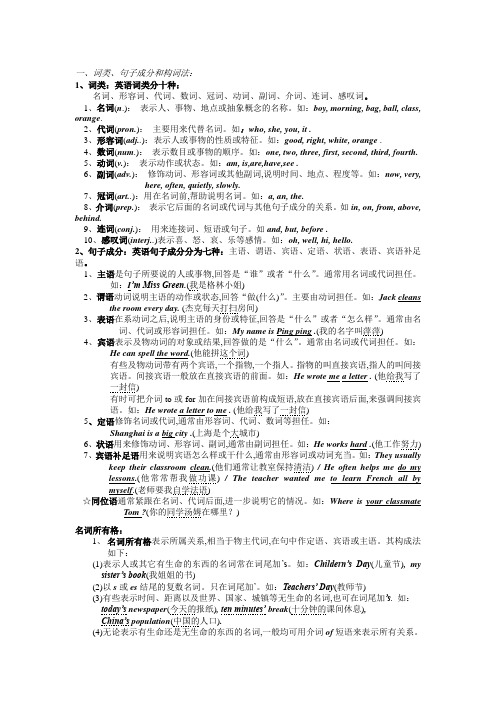
一、词类、句子成分和构词法:1、词类:英语词类分十种:名词、形容词、代词、数词、冠词、动词、副词、介词、连词、感叹词。
1、名词(n.):表示人、事物、地点或抽象概念的名称。
如:boy, morning, bag, ball, class, orange.2、代词(pron.):主要用来代替名词。
如:who, she, you, it .3、形容词(adj..):表示人或事物的性质或特征。
如:good, right, white, orange .4、数词(num.):表示数目或事物的顺序。
如:one, two, three, first, second, third, fourth.5、动词(v.):表示动作或状态。
如:am, is,are,have,see .6、副词(adv.):修饰动词、形容词或其他副词,说明时间、地点、程度等。
如:now, very,here, often, quietly, slowly.7、冠词(art..):用在名词前,帮助说明名词。
如:a, an, the.8、介词(prep.):表示它后面的名词或代词与其他句子成分的关系。
如in, on, from, above, behind.9、连词(conj.):用来连接词、短语或句子。
如and, but, before .10、感叹词(interj..)表示喜、怒、哀、乐等感情。
如:oh, well, hi, hello.2、句子成分:英语句子成分分为七种:主语、谓语、宾语、定语、状语、表语、宾语补足语。
1、主语是句子所要说的人或事物,回答是“谁”或者“什么”。
通常用名词或代词担任。
如:I’m Miss Green.(我是格林小姐)2、谓语动词说明主语的动作或状态,回答“做(什么)”。
主要由动词担任。
如:Jack cleansthe room every day. (杰克每天打扫房间)3、表语在系动词之后,说明主语的身份或特征,回答是“什么”或者“怎么样”。
词类和句子成分
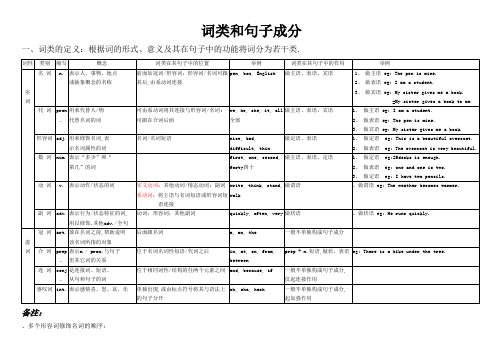
词类和句子成分一、词类的定义:根据词的形式、意义及其在句子中的功能将词分为若干类.备注:、多个形容词修饰名词的顺序:限定词冠词、物主代词、指示代词+ 数词three+ 描绘词beautiful+ 大小、长短、高低等形体性形容词large,long,high+新旧old+ 颜色red+ 国籍Chinese+ 材料wooden+用途writing+被修饰名词desk口诀:限定描述大长高,形状年龄与新老;颜色国籍出材料,用途类别往后靠.特殊形容词:距离 farther farthestfar程度 further furthest不规则的形容词:good better best bad/ill worse worst many/much more most few/little fewer/less fewest/least2、多个副词的排列顺序:时间、地点副词:小单位在前,大单位在后eg: The children played games quietly in their room yesterday.3、及物动词vt.:后面要跟宾语,意义才完整.实义动词有完全的词义,并能独立做谓语不及物动词vi.:本身意义完整,后面不需要跟宾语.动词的分类系动词:做谓语时,后接表语 eg: get, be, become, look情态动词:表示能力、义务、必要、猜测等说话的语气和情感 eg: can, could, must, may, might助动词:常和主要动词一起构成各种时态、语气、语态等动词形式,以及用于否定、疑问等结构中,有shall, will, have, be, should, would, do 状态系动词:用来表示主语状态,只有be系动词感官系动词:有feel,smell,look,sound,taste持续系动词:用来表示主语继续/保持一种状态/态度.有keep,rest,stay,remain变化系动词:表示主语变成什么样. 有become, grow,turn,go,get二、句子成分:一个句子由各个功能不同的部分所构成,这部分叫做句子成分.英语句子成分口诀主谓宾表定状补,七种成分记清楚;句子主干谓宾主系表,枝叶成分定装补.三、简单句五种基本句型句型一: S + V 主+谓eg: Time flies.句型二:S + V + P 主+谓/系+表特点:句子谓语动词都不能表达一个完整的意思,必须加上一个表明主语身份/状态的表语构成复合谓语,才能表达完整的意思.这类动词叫连系动词. eg: This is an English book. Everything looks different. The weather becomes cooler.句型三: S + V + O主+谓vt.+宾特点:谓语动词都是实义动词,但不能表达完整的意思,必须跟宾语,即动作的承受着,才能使意思完整,这类动词叫及物动词.eg: We like the movie. She often helps her mother.句型五:S + V +InD + DO主+谓+间宾+直宾特点: 谓语动词必须跟两个宾语才能表达完整的意思,这两个宾语,一个是动作的直宾,另一个动作是间宾.通常改为:S + V + DO + prep + InDeg:She gives me an apple. She gives an apple to me.句型五:S + V + O +OC主+谓vt.+宾 +宾补特点: 动词虽然是vt.但是跟一个宾语还不能表达完整的意思,必须加上一个补充成分来补足宾语,才完整.判断原则:能表达成一个宾语是…/做…eg: We made him the monitor. We keep the table clean.。
词类和句子成分

一、关于词类和句子成分根据词的形式、意义及其在句中的功用将词分为若干类,叫做词类。
一个句子由各个功用不同的部分所构成,这些部分叫做句子成分。
学一个词,要学它的发音、拼法、意义,也要记它的词类;更重要的是要了解它和其他词的关系,及其在句中作什么句子成分。
如China is in East Asia(中国位于东亚)一句中的China这个单词所属的词类是名词,在句子中作主语。
词类(parts of speech)英语的词通常分为十大类:1)名词(noun,缩写为n.)是人和事物的名称,如pen(钢笔),English(英语),life(生活)。
2)代词(pronoun,缩写为pron.)是用来代替名词的词,如we(我们),his(他的),all(全部)。
3)形容词(adjective,缩写为adj.)用来修饰名词,如great(伟大的),honest(诚实的),difficult(困难的)。
4)数词(numeral,缩写为num.)是表示"多少"和"第几"的词,如four(四),eighteen(十八),first(第一),eighth(十八),hundred(一百)。
5)动词(verb,缩写为v)表示动作和状态,如write(写),walk(行走),think(想)。
6)副词(adverb,缩写为。
adv.)是修饰动词、形容词和副词的词,如quickly(快),often(经常),very(很)。
7)冠词(article,缩写为art.)说明名词所指的人或物的词,如a,an(一个),the(这,那)。
8)介词(preposition,缩写为prep.)表示名词(或代词)与句子里其它词的关系,如from(从),in(在…内),between(在…之间)。
9)连词(conjunction,缩写为conj.)是连接词、短语、从句和句子的词,如and(和),because(因为),if(假如)。
简明语法系列词类、句子成分与句子类型讲义

词类、句子成分与句子类型词类1. 词的分类英语中的词根据其形式特征、词义以及在句子中的作用可以分成十大类,称为词类(Parts of Speech)。
词类英语名称缩写形式例词名词noun n. net网nation 民族代词pronoun pron. he他someone 某人形容词adjective adj. lovely可爱的afraid 害怕的数词numeral num. five 五sixth 第六动词verb V. cut割jump 跳副词adverb adv. well好clearly 清楚地冠词article art. a一(个) the这、那介词preposition prep. for为了with和连词conjunction conj. but但是since自从感叹词interjection int. oh哦ah啊名词、代词、形容词、数词、动词和副词能在句中独立充当成分,称为实词。
冠词、介词、连词和感叹词不能在句中独立充当成分,称为虚词。
2. 同一词用作不同的词类同一个词在不同的场合可以用作不同的词类。
例如:I used to swim in the pond in front of my house.我以前常在屋前的池塘里游泳。
(v.)I'd like to have a swim in the pond.我很想在池塘里游泳。
(n.)Apples usually grow in the north.苹果通常生长在北方。
(n.)The wild ducks are flying north.大雁正向北飞。
(adv.)He gave me a photo album as a present.他送我一本照相册作为礼物。
(n.)He was present at the party.他出席了那场聚会。
(adj.)He was badly hurt in the head.他头部负重伤。
词类和句子成分
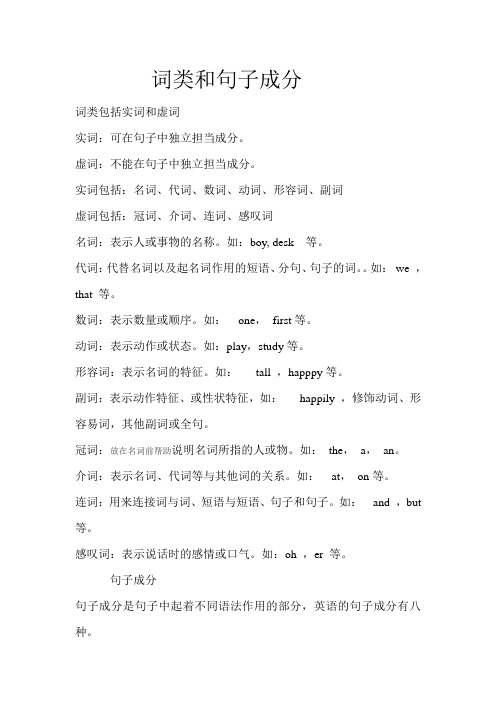
词类和句子成分词类包括实词和虚词实词:可在句子中独立担当成分。
虚词:不能在句子中独立担当成分。
实词包括:名词、代词、数词、动词、形容词、副词虚词包括:冠词、介词、连词、感叹词名词:表示人或事物的名称。
如:boy, desk 等。
代词:代替名词以及起名词作用的短语、分句、句子的词。
如:we ,that 等。
数词:表示数量或顺序。
如:one,first等。
动词:表示动作或状态。
如:play,study等。
形容词:表示名词的特征。
如:tall ,happpy等。
副词:表示动作特征、或性状特征,如:happily ,修饰动词、形容易词,其他副词或全句。
冠词:放在名词前帮助说明名词所指的人或物。
如:the,a,an。
介词:表示名词、代词等与其他词的关系。
如:at,on等。
连词:用来连接词与词、短语与短语、句子和句子。
如:and ,but 等。
感叹词:表示说话时的感情或口气。
如:oh ,er 等。
句子成分句子成分是句子中起着不同语法作用的部分,英语的句子成分有八种。
主语:表示句子描述的是谁或什么,是陈述对象。
谓语:说明主语的动作或状态。
表语:说明主语的性质特征、状态或身份,与连系动词一起构成复合谓语。
宾语:是用在及物动词或及手的短语动词后表示行为的对象或结果、或用于介词后构成介词短语。
补足语:分宾语补足语和主语补足语,分别用来补足说明主动句中的宾语或被动句中的主语。
定语:用于修饰或限定名词或代词。
状语:用于修饰动词、形容词、副词或整个句子。
同位语:是对前面的名词或代词做进一步的解释。
- 1、下载文档前请自行甄别文档内容的完整性,平台不提供额外的编辑、内容补充、找答案等附加服务。
- 2、"仅部分预览"的文档,不可在线预览部分如存在完整性等问题,可反馈申请退款(可完整预览的文档不适用该条件!)。
- 3、如文档侵犯您的权益,请联系客服反馈,我们会尽快为您处理(人工客服工作时间:9:00-18:30)。
(六)副词
• 副词可分为四种,包括: • 1普通副词,例如:together(一起), well(好),carefully(仔细地) ; • 2疑问副词,例如:when(何时), where(何地),how(如何),why(为 什么)等;
• 3。连接副词,例如: therefore(因此),then(然后), however(然而),otherwise(否 则)等; • 4。关系副词,例如:where, when, why等。
• 并列连词是连接并列关系的词、短语、从 句或句子的连词,例如:and(和), or(或者、 否则), but(但是), for(因为), not only...but also(不仅...而且), neither...nor(即不...也不)。 • 从属连词是连接主从复合句的主句和从句 的连词,例如:that, if(如果), whether(是 否), when(当...时候), although(虽然), because(因为), so that(结果)。
名词可分为两大类 • 1。普通名词(common noun)是某 一类人、事物、某种物质或抽象 概念的名称。例如 • teacher 教师 market市场 rice 大米 magazine杂志 sound 声音 production生产
• 2。专有名词(proper noun)是特 定的某人、地方或机构的名称。 专有名词的第一个字母必须 大写。例如: • Hemingway海明威 • Russia 俄罗斯 New York 纽约 United Nations联合国
定语
• 修饰名词或代词的词、短语或句子。
• a beautiful girl • They are woman workers. • The apple that I ate yesterday was very sweet.
状语
• 是修饰动词、形容词、副词等的句子 成分。
• We will fly to Beijing in two days.(时 间状语) • The boys are playing football on the ground.(定点地点状语)
词类
含义和分类
•
能够自由运用的最小语言单位叫词。 根据词的形式、意义及其在句中的 作用所作的分类叫词类。 • 英语的词通常分为十大类,即名 词、冠词、代词、数词、形容词、 副词、动词、介词、连词和感叹词。
(一)名词 • 名词(noun)是表示人、事物、 地点或抽象概念的名称。 • 例如: • foreigner外国人 soap 肥皂 Newton牛顿 law 法律 freedom自由 peace 和平
• I can do this job myself.
表语
• 是用来说明主语的身份、特征和状态的, 它的位置在系动词之后. • 名词、代词、形容词与分词、 • 数词、动词不定式、介词短语、副词以及 表语从句等
• I am a student.(名词) • Who‘s that? It’s me.(代词)
名词又可分为可数名词 (countable noun)与不可数名词 (uncountable noun)两种。 • 可数名词有单、复数之分。绝大 多数名词的复数形式的构成是在 单数名词的后面加-s或-es。
•
•
shop→shops商店 bus→buses 公共汽车 library→libraries图书馆 toy→toys 玩具 leaf→leaves树叶
• 英语中有一些名词的复数 形式是不规则的。例如: • man→men男人 tooth→teeth牙齿
(二)冠词
• 冠词(article)放在名词之前, 帮助说明该名词所指的对象。 • 冠词分为不定冠词(indefinite article)和定冠词(definite article)两种。
• 不定冠词为a/an,用在单数名词 之前,表示某一类人或事物的“一 个”。a用在以辅音开头的名词之 前,an用在以元音开头的名词之前。 例如: • a hotel 一家旅馆 • a useful book 一本有用的书 • an exhibition一次展览 • an honest man一个诚实的人
• 定冠词:the,表示某一类人或事 物中特定的一个或一些。 • 可用于单数或复数名词前,也可用 于不可数名词前。例如: • the TV programs 那些电视节目 • the house那座房子 • the Olympic Games奥运会
(三)代词
• 代词(pronoun)是用来指代人或事 物的词。代词包括:
ห้องสมุดไป่ตู้
代词分类
• 1。 人称代词,如:I, you, they, it 等; • 2。 物主代词,如:my, his, their, our, mine, hers等 • 3。 反身代词,如:myself, yourself, itself, ourselves, oneself 等
• 4. 相互代词,如:each other, one another等; • 5 指示代词,如:this, that, these, those, such, same等; • 6 疑问代词,如:who, whom, whose, which, what等;
(十)感叹词
• 感叹词(interjection)是表示喜怒哀 乐等感情的词,例如:oh, well, why, hello等。
句子成分 • 由不同词类的单词,按照一 定的语法规则组合在一起, 能表达一个完整意思的语言 单位叫做句子。
• 一个句子由各个功能不同的部 分构成,这些部分叫做句子成 分。
• 英语的句子成分有八种: • 主语、谓语动词、表语、宾 语、定语、状语、主语补足 语和宾语补足语
主语
• 主语(subject)是句子所要说明的人 或事物,是句子的主体。
• 位置通常在句首,一般不省略。 • 可以担当主语的有名词、代词、数 词、动词不定式、动名词和主语从 句
• I am a student. • The apple is very sweet. • Smoking is not allowed in public places.
实义动词
• 实义动词还可根据是否需要宾语分为及物 动词和不及物动词。
• 动词有四中基本形式,即动词原形、过去 式、过去分词和现在分词 • 原形 过去式 过去分词 现在分词 live lived lived living • build built built building have had had having
谓语动词
• 谓语是说明主语的动作或状态的 句子成分。谓语动词的位置一般在 主语之后. • 实义动词 • 系动词 • 助动词 • 情态动词
• The car hit into the tree. • I am a student.
• Mary has been working at the dress shop since 1994.
(八)介词
• (preposition) • 放在名词、代词前。 介词在句中一般不 重读,也不能单独作句子成分。
介词根据其构成,可分为
• 简单介词,如:in, at, for, on ,over等; • 复合介词,如:into(进入), as for(至 于), out of(出自); • 二重介词,如:until after(直至...之后), from among(从...当中);
情态动词
• 情态动词表示能力、义务、必要、猜测等 说话人的语气和情感。情态动词只能和原 行动词一起构成谓语动词。英语情态动词 主要有can(能够),may(可以,也许), must(必须)及其过去形式could, might等。
助动词
• 助动词常和主要动词一起构成各种时态、 语态、语气等动词形式,以及用于否定和 疑问等结构中。英语助动词主要有shall, will, have, be, should, would, do等。
(七)动词
• 动词(verb)是表示动作或状态的词,例如: sign(签字),support(支持),have(有), exist(存在)等。 • 动词根据起意义和作用可分为实义动词、 系动词、情态动词和助动词。
实义动词
• 实义动词有完全的词义,并能独立作谓语. • 例如:explain(解释),stay(停留),have(有) 等。 • 系动词作谓语时,后面需接表语。常见英 语系动词有:be(是),seem(似乎), look(看起来),become(变成),appear(显 得),get(变得),feel(感到),turn(变成), remain(仍然是)等。
This girl is very beautiful.(形 容词)
宾语
• 宾语(object)表示动作的对象, 是动作的承受者 。一般放在动词 之后。
• I read a book. • She played football.
• He wants to dream a nice dream.
• 7。 关系代词,如:who, whom, whose, which, that等; • 8。 不定代词,如:some, any, no, all, one, every, many, a little, someone, anything等;
(四)数词
• 数词(numeral)是表示“数量”和“顺序” 的词。前者称为基数词, • 例如:one(一),twenty • 后者称为序数词,例如:first(第一), twentieth(第二十),fifty-first(第五十一)等。
(五)形容词
• 形容词(adjective)是用来修饰名词,表 示名词属性的词。 • 例如:yellow(黄色的),wonderful(惊 人的),strong(强大的)。 • 形容词一般放在它所修饰的名词之前 • 例如:busy streets(繁华的街道), public relations(公共关系),young men(年轻人)等。
